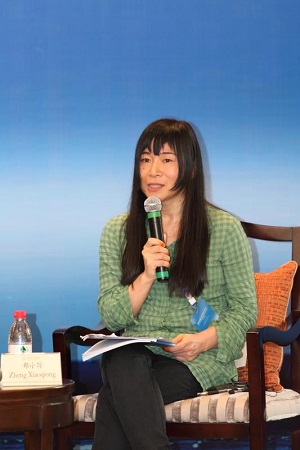鄭小瓊:詩(shī)歌之胃

詩(shī)歌之胃
“這饑餓的胃,吞下一列奔跑的火車”(詩(shī)歌《胃》),多年前,我對(duì)詩(shī)歌與時(shí)代的關(guān)系有過如此的表達(dá)。我一直以為詩(shī)歌有一顆巨大的胃,它能消化橡膠、煤、鈾、月亮、昆蟲、飛鳥,正如五金廠的機(jī)器,“每天吃下鐵,圖紙∕星辰,露珠,咸味的汗水,它反復(fù)剔牙∕吐出利潤(rùn),鈔票,酒巴”。如何讓詩(shī)歌之胃有效地消化時(shí)代這列奔跑的火車,用詩(shī)歌將時(shí)代與現(xiàn)實(shí)的關(guān)系呈現(xiàn)出來,將真實(shí)的生活與內(nèi)心的鏡像呈現(xiàn)出來,如何將倫理與藝術(shù)有機(jī)結(jié)合起來。我一直在尋找這樣一種有體溫的詩(shī)歌,這種溫度從倫理上來源于生活,來源于現(xiàn)實(shí),來源于人,從藝術(shù)上來源于被人們忽視的詞語(yǔ)中,來源于詩(shī)歌內(nèi)部的技藝。
無論是名詞或者動(dòng)詞,都有一個(gè)內(nèi)在暗示的支點(diǎn),我們要找到它,將內(nèi)心的鏡象呈現(xiàn)出來。科學(xué)家阿基米德曾說給他一支點(diǎn),可以撬起地球,在詩(shī)歌中,我們何嘗不是用具體語(yǔ)言的支點(diǎn)將整個(gè)世界在詩(shī)歌中平衡。用詞語(yǔ)為支點(diǎn),撬動(dòng)現(xiàn)實(shí)的世界,用詞語(yǔ)讓現(xiàn)實(shí)倫理與藝術(shù)審美達(dá)到平衡。我在工廠生活多年,面對(duì)的日常生活是細(xì)小的螺絲、鐵片、塑膠、玩具……這些詞語(yǔ)的背后是戶籍、訂單、經(jīng)濟(jì)危機(jī)、資本市場(chǎng),在這些龐大的與細(xì)小的事物間,如何用詩(shī)歌之胃將它們消化,變?yōu)樗囆g(shù),如何在社會(huì)現(xiàn)實(shí)這個(gè)龐然大物與細(xì)小的日常生活間尋找平衡之道,藝術(shù)地呈現(xiàn)社會(huì)現(xiàn)實(shí)。我在詩(shī)歌《電子廠》里表達(dá)過,“這細(xì)小的元件/被賦予了龐大的意義,經(jīng)濟(jì),資本/品牌,訂單,危機(jī),還得加上爭(zhēng)吵的/愛情”,在細(xì)小的電子晶片與經(jīng)濟(jì)、資本、品牌間建構(gòu)內(nèi)心的詩(shī)歌,“可以肯定在電子廠,時(shí)代在變小/無限地小……小成一塊合格的二元管”。面對(duì)社會(huì)倫理與詩(shī)歌藝術(shù),我選擇了一些具有方向性的暗示的詞作為某種支點(diǎn)來平衡二者的關(guān)系,比如 “她站在某個(gè)五金廠的窗口/背對(duì)著遼闊的祖國(guó),昏暗而渾濁的路燈用一臺(tái)機(jī)器收藏了她內(nèi)心的孤獨(dú)”(詩(shī)歌《劇》)。在這句詩(shī)中,“窗口”與“路燈”便是這樣的支點(diǎn)。“窗口”這個(gè)詞,它本身具有強(qiáng)烈的擴(kuò)張性,我將其擴(kuò)張到一種極致,將其過渡到更為龐大的事物,從“窗口”到“祖國(guó)”是一種極致的向外擴(kuò)張。“路燈”這個(gè)詞則有收縮性,將這個(gè)詞不斷地壓縮,讓它從龐大的意象之間返回個(gè)體內(nèi)心的鏡象之中,從“路燈”到“內(nèi)心的孤獨(dú)”是一種向內(nèi)性的收縮。在詩(shī)歌中精確地尋找這樣具有支點(diǎn)性的詞語(yǔ),來實(shí)現(xiàn)社會(huì)倫理與詩(shī)歌藝術(shù)巧妙的平衡。
詩(shī)歌中的詞語(yǔ)具有無限可能性,詞的多種意義像不斷交叉的路徑,不斷地蜿蜒伸展交錯(cuò),讓我們的表達(dá)有了無限種的可能性。面對(duì)自己的現(xiàn)實(shí)生活時(shí),將一些具體的事物,比如圖紙,鐵銹,機(jī)臺(tái),鋼針,螺絲,膠片,合格紙等,不斷通過某種暗喻來呈現(xiàn)內(nèi)心的精神感受。這些支點(diǎn)性的詞語(yǔ)有時(shí)如一枚鐵釘,能將龐大的事物釘在詩(shī)歌的墻上,它讓圖紙鐵銹等日常事物發(fā)生了巨大而復(fù)雜的變化,比如斑駁的鐵銹便可以隱喻起伏不定的人生,“鐵”可以隱喻不同的內(nèi)心情感,比如憂傷,疼痛,喜悅等,大大地拓展“鐵”在藝術(shù)表達(dá)中的美學(xué)意義。鐵、鐵銹、起伏不定的人生、內(nèi)心的憂傷與喜悅等這些事物與情感我們?cè)缫阎绾瓮ㄟ^有效的詞語(yǔ)將其內(nèi)在關(guān)系連接起,讓我們的詩(shī)歌有了區(qū)別于以往作品的新的方式,拓展原來固定的意象審美與情感表達(dá),在我的詩(shī)集《黃麻嶺》中,我探索對(duì)“鐵”“雨水”“鑼釘”等工業(yè)詞語(yǔ)在現(xiàn)代詩(shī)歌的美學(xué)意義,實(shí)現(xiàn)詩(shī)歌對(duì)社會(huì)現(xiàn)實(shí)的發(fā)聲。我相信每一件事物中都包含著不同的詩(shī)意,詩(shī)人們只是在特定的時(shí)候發(fā)現(xiàn)已存在于它身上的詩(shī)意的一部分,詩(shī)歌要不斷沖破日常事物以往固有的條條框框的樊籬,讓它承載新的意義與生命力。
“在胃里藏一個(gè)活著的靈魂”(詩(shī)歌《胃》),詩(shī)歌之胃除了要吞下時(shí)代這列“奔跑的火車”外,還應(yīng)有一個(gè)“活著的靈魂”。“活著的靈魂”來自于藝術(shù)的本身,也來自于生命的本身。只有用藝術(shù)的方法去穿透時(shí)代與現(xiàn)實(shí)的外部與表面,直抵事物的核心,詩(shī)歌才會(huì)有“活著的靈魂”。我不斷地在詩(shī)歌中表達(dá)打工生活,不斷地從工業(yè)區(qū)、路燈、流水線、鐵片、雨水等去尋找新的意義。當(dāng)一塊鐵因?yàn)樗鼣[在機(jī)臺(tái)上,或露天,或倉(cāng)庫(kù),或爐火等不同的位置上,我能不能尋找到不同的隱喻與意義呢?它彎曲了,它化著鐵水,它變成了某個(gè)制品,它生銹了,它涂上油漆了等等,其實(shí)在這些變化中,它本身就隱含了不同的暗喻與意義,我們能不能沖破以往固有的條條框框的樊籬,發(fā)現(xiàn)新的隱喻與含義,如何打通它們與社會(huì)之間的關(guān)系,讓自己的思想、感情與工業(yè)時(shí)代的事物保持一種微妙的平衡。如何發(fā)現(xiàn)電腦、水泥、高樓、鋼鐵、網(wǎng)絡(luò)、塑料等這些工業(yè)化時(shí)代的詞語(yǔ)的詩(shī)意,我希望它們,它們和流水、樹木、群山等傳統(tǒng)的事物一樣,都具有詩(shī)意,探索這些工業(yè)詞語(yǔ)的奧妙,認(rèn)識(shí)工業(yè)事物的真諦,我一直認(rèn)為雙手建造的事物與大自然賜與的事物都是神圣的,對(duì)這些新的事物需要保持戀人一樣的熱情,熱愛著自然也熱愛著自身的創(chuàng)造,在這些機(jī)器、塑膠中,都飽含了人類自己的智慧。從生活具體的情景與事件、人物中出發(fā),給平凡的人和最不起眼的主題以新的視角,給表達(dá)對(duì)象以人性與藝術(shù)的雙層尊嚴(yán)。我不愿意自己的表達(dá)對(duì)象會(huì)在擁擠不堪中被巨大的人群壓碎,變成一張面孔,一個(gè)影子,一個(gè)數(shù)字的一部分,變成擁擠的人群擠成一個(gè)失蹤者,不愿她們?cè)谌巳褐袉适Я俗约海[匿了自己。在這個(gè)“奔跑的火車”的社會(huì)中,我們被數(shù)字統(tǒng)計(jì),被公共語(yǔ)言簡(jiǎn)化,被歸類、整理、淘汰、統(tǒng)計(jì)、省略、忽視……我覺得自己要從人群中或者繁復(fù)的社會(huì)中將我表達(dá)的對(duì)象掏出來,把她們變成一個(gè)個(gè)具體的人,她們是一個(gè)女兒、母親、妻子、父親、丈夫……他們的柴米油鹽、喜樂哀傷、悲歡離合……她們是獨(dú)立的個(gè)體,有著一個(gè)個(gè)具體名字,來自哪里,做過些什么,從人群中找出她們或者自己,讓她們返回個(gè)體獨(dú)立的世界中,讓她們還以人性的尊嚴(yán)。
只有這種尊嚴(yán)才能給“詩(shī)歌之胃”“活著的靈魂”,“詩(shī)歌之胃”不僅僅吞下時(shí)代“這列奔跑的火車”,也有了藝術(shù)的尊嚴(yán),詩(shī)歌的尊嚴(yán)。
The Stomach of Poetry
Zheng Xiaoqiong
“This starving stomach swallowed a speeding train” (Stomach). These were the words I used many years ago to describe the relation between poetry and our times. I’ve always believed that poetry has a gigantic stomach able to digest rubber, coal and uranium the same way it can digest the moon, an insect or stray birds. In this sense, it’s just like a factory machine which “feeds on iron and diagrams/ Starlight, dewdrop, salty sweat, it keeps picking its teeth/ Spitting profits, banknotes and alcohol”. I’ve been seeking the kind of poetry that has the stomach to assimilate the fast moving train of this age, poetry that mirrors the reality of this time and the reality of the heart, poetry that interweaves ethics and art, poetry that gives off warmth, a warmth ethically originated in life, reality and humanity, whereas artistically rooted in neglected words and poetic artistry.
Every noun and verb has an implicit fulcrum which we need to find in order to show what’s inside ourselves. The great scientist Archimedes once said “Give me a lever long enough and a fulcrum on which to place it and I shall move the world.” Likewise, couldn’t it be that standing on the fulcrum of words, we balance the world through poetry? For on the fulcrum of words, ethics and art also find balance in the real world. I spend many years of my life in a factory coexisting with small things like screws, iron sheets, plastics, toys…But behind these words underlie bigger ones such as housing registration, purchase orders, economic crisis and capital markets. How can the stomach of poetry digest these things, regardless of their triviality or enormousness, and turn them into art? How can we balance the enormity of social reality with the triviality of ordinary life? Just like the description in my poem Electronics Factory: “This tiny little component/a greater meaning conveys, economy, capital/Brand, purchase orders, crisis, and quarrelling on top/Love”, words like microchips, economy, capital and brands inspire my poetry: “In the electronics factory the times are shrinking/unendingly shrinking…up to become a qualified diode”. I tend to use suggestive words with directional meanings as a fulcrum to balance social ethics and poem artistry. For example, in the following poem: “Standing by the window of some hardware factory/ with her back against the boundless motherland, a dim and muddy streetlight hid away her solitude, using a machine” (Drama). On these lines the words “window” and “street lamp” are fulcrums. The word “window” has an expansive nature, which allows it to extend itself to its very limit and convey something as big as the “motherland”. “Street lamp” on the other hand, has a narrowing nature. Its enormity shrinks to the point of becoming a part of an individual emotion such as “solitude”. That is how I find the subtle balance between social ethics and poem artistry: by selecting words in poems as fulcrums to stand on.
Words in poems have an endless myriad of possibilities. Carrying various meanings, extending and intersecting with each other, they offer unlimited possibilities to our expression. In life, tangible things such as diagrams, rust, work boards, steel needles, screws, films and paper can be used as metaphors to convey deep human emotions. Sometimes these fulcrum-words are like iron nails, capable of nailing gigantic matters on the wall of poetry which in turn brings enormous and complex changes to ordinary things such as diagrams and rust. Mottled rust, for example, can allude to the twists of life; iron can convey different emotions like sorrow, pain or joy, which then again provide the word “iron” with a broader aesthetic meaning... We have long known things like iron and rust, we are aware of the twists of life and we are acquainted with emotions such as sorrow and joy, but what we need now are effective words to link the internal relations in order to distinguish our poems from previous artistic works and to challenge the rooted clichés of symbols and emotions. I did my own experiment in my Poetry Anthology Huangma Hill as I explored the aesthetic meanings of industrial words like “iron”, “rain” and “screw” in modern poems, with the aim to allow society to find their own voice in poetry. It is my belief that there is poetry in every object, of which only part is found by poets at some point. Poems need to break free from the fence of stereotypes in order to bring about new meanings and vitality.
“There is a living soul inside this stomach” (Stomach) the stomach of poetry ought to own a “l(fā)iving soul” when swallowing the “speeding train” of this time. This “l(fā)iving soul” finds its source both in art and in life. Only the poems that penetrate the superficial shell of time and reality to reach the very essence of things are poems with a “l(fā)iving soul”. I’ve been writing poems about my life as a factory worker, seeking new meanings from industrial zones, street lights, production lines, iron sheets and rain. Is it possible to look for different metaphors and meanings for the same iron sheet when placed in different spaces such as a machine bed or the open air, a warehouse or a stove fire? Iron can be bent, melted or turned into a product; it can rust, it can also be painted. All those changes and transformation of the same iron: bending, melting, becoming a product, being corroded or painted contain different implications and metaphors for us to discover by breaking free from the shackles of stereotypes. How can we build the link between those meanings and society to maintain a subtle balance between our thoughts, our emotions and things amidst this Industrial Age? How can we find poetry in words like computer, skyscraper, iron, steel, Internet, plastic, to the extent that we do in traditional poetic words like water, trees and mountains, discovering the magic of industrial vocabulary and unveiling the truth of industrial objects? I’ve always believed that both what is built by human hands and what is given by nature is sacred. Therefore, we should cherish our creations no less than we cherish nature, for machines and plastics are too a product of human wisdom. You should represent ordinary people and those least noticed from a human perspective, then you’re dignifying them both from a human and from an artistic point of view. I would never want my art subjects to be crushed by the crowd and just become a face, a shadow, a single digit of a big number or a lost person among the crowd. Nor would I want them to lose or hide themselves in the same crowd. On this “speeding train” of society everyone is numbered, simplified by language, categorized, arranged, eliminated, calculated, omitted and neglected… What I want to achieve is to humanize my subjects in the crowd, turn them into a daughter, a mother, a wife, a father, or a husband…into people with everyday life, joy and sorrow. They are individuals with names, birth places and personal histories. Find yourself or find them, take them out from the crowd and give them back their individual identity and dignity.
Only this dignity can give a “l(fā)iving soul” to “the stomach of poetry”, so that this stomach, instead of just swallowing the “speeding train” of this age, can truly enjoy the dignity of art and poetry.


